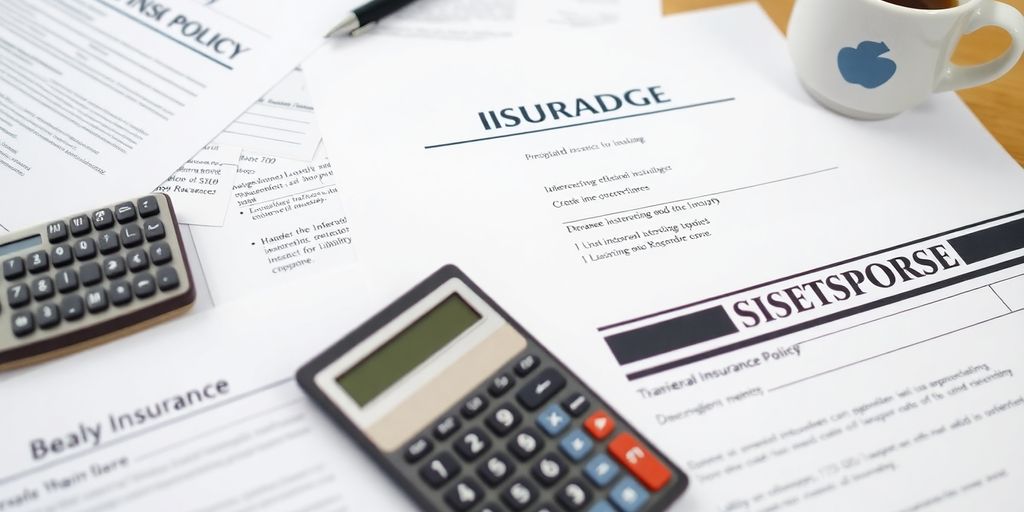How do you determine how much liability insurance you need?

Figuring out how much liability insurance you need can feel like trying to solve a puzzle. It's not just about picking a number out of thin air. You gotta think about what you own, what risks you're facing, and how much you can afford to lose if something goes wrong. It's like putting together a safety net for your wallet, making sure you're covered if life throws a curveball your way. Let's break it down, step by step, so you can get a handle on what works best for you.
Key Takeaways
- Liability coverage acts like a financial safety net, protecting your assets if things go south.
- Understanding terms like bodily injury and property damage liability is crucial for making informed decisions.
- Balancing your assets against potential risks helps determine the right coverage amount.
- Skipping liability coverage might seem like a way to save, but it can cost you big time in the long run.
- Customizing your policy ensures it meets your specific needs, so you're not overpaying for unnecessary coverage.
Why Liability Coverage is Like a Safety Net for Your Wallet
The Unexpected Slip-and-Fall Scenario
So, picture this: You're at your favorite coffee shop, juggling your latte, phone, and that pastry you probably shouldn't have bought. Suddenly, you slip on a mysterious wet patch on the floor. Bam! Down you go, and now you're nursing a bruised ego and a sore backside. Liability insurance is like that invisible cushion that helps soften the financial blow when someone takes a tumble on your turf. It covers medical expenses and legal fees if someone decides to take you to court over their little mishap.
When Your Words Get You in Trouble
Ever had one of those days where you accidentally insult your boss's favorite band or tell a client their new haircut is "interesting"? Words can land you in hot water faster than you can say "oops." Liability insurance steps in when your words create a legal storm, covering the cost of defamation suits or slander claims. It's like having a mute button for your wallet—protecting your finances when your mouth runs faster than your brain.
The Perils of Borrowing Without Asking
Imagine borrowing your neighbor's lawnmower without asking, thinking you'll return it before they even notice. But then, you accidentally mow over a rock, sending it flying through their window. Whoops! Liability insurance can help cover the repair costs and any legal fees if your neighbor decides to sue you for damages. It's like a financial "get out of jail free" card for those "I swear I was gonna return it" moments.
"Liability insurance is your financial superhero, swooping in to save the day when life throws you unexpected curveballs. Whether it's a slip, a slip of the tongue, or a slip-up with your neighbor's stuff, it's got your back."
With general liability insurance, you can customize your coverage to meet your specific needs, ensuring you're protected in all the right places. So, next time you find yourself in a sticky situation, you'll have a safety net ready to catch you.
Decoding the Liability Coverage Jargon: A Fun Guide

What on Earth is Bodily Injury Liability?
Alright, let's dive into the world of bodily injury liability. Imagine you're at a party, and someone trips over your foot and breaks their arm. Bodily injury liability is your insurance's way of saying, 'Hey, don't worry, we've got this!' It covers the medical expenses and even legal fees if that person decides to sue you. It's like having a financial superhero cape that swoops in when things go awry.
Property Damage Liability: Not Just for Clumsy People
Property damage liability isn't just for those who constantly knock things over. Let's say you accidentally back your car into your neighbor's fence. Whoops! Property damage liability steps in to cover the repair costs. It's not just about covering your clumsiness; it's about ensuring you're not financially drained from a minor mishap.
Understanding Personal and Advertising Injury
This one sounds fancy, right? Personal and advertising injury covers you when your actions or words unintentionally harm someone else's reputation. Maybe you wrote a blog post that accidentally defamed someone, or you used a photo without permission. This coverage helps with legal costs and settlements. It's like having a lawyer on speed dial for those "Oops, did I just say that?" moments.
"Understanding liability insurance can feel like learning a new language, but once you get the hang of it, you'll wonder how you ever lived without it."
By the way, if you're curious about how liability coverage fits into broader insurance strategies like cyberliability insurance, it's worth checking out how different policies can protect your assets in today's digital world.
How to Choose the Right Amount of Liability Coverage Without Losing Your Mind

Choosing the right amount of liability coverage can feel like trying to pick the perfect avocado at the store. It's daunting, but let's break it down, so you can protect your wallet without losing your sanity.
Assessing Your Assets: More Than Just Counting Pennies
First things first, let's figure out what you're working with. Take a look at your assets. We're talking about your home, your car, your savings, and even that collection of vintage comic books you swear will be worth something someday. Add it all up. Now, subtract any debts you have. This will give you a rough idea of your net worth. This number is crucial because, if someone sues you, that's what's at stake. You don't want to lose your hard-earned stuff just because you skimped on insurance.
The Art of Balancing Risk and Coverage
Next up, think about your lifestyle. Are you a thrill-seeker who loves extreme sports, or do you prefer a quiet evening with a book? Your activities can increase your risk of needing liability coverage. If you're on the adventurous side, you might want higher coverage. It's like wearing a helmet when you ride a bike. Sure, it might not look cool, but it's better than a concussion.
When to Consider an Umbrella Policy
Sometimes, your standard liability coverage isn't enough, especially if your assets exceed your policy limits. That's where an umbrella policy comes in. It's like the extra guac on your burrito—costs a bit more, but when you need it, you'll be glad you have it. An umbrella policy provides additional coverage beyond your regular policy limits, protecting you from major claims and lawsuits.
"Choosing the right liability coverage isn't just about ticking a box; it's about securing peace of mind. Think of it as a safety net for your financial future."
Remember, the goal is to determine your car insurance needs by assessing potential losses from lawsuits after an accident. Choose liability limits that align with your financial situation and ensure your policy provides adequate coverage. So, take a deep breath, grab a cup of coffee, and tackle this insurance puzzle one piece at a time.
The Cost of Liability Coverage: More Affordable Than You Think
Hey there, let's dive into the world of liability coverage and why it's not as wallet-draining as you might think.
Factors That Affect Your Premiums
Alright, so let's talk about what makes your liability coverage cost what it does. It's like baking a cake, but instead of flour and eggs, you’ve got factors like your driving record, location, and the type of car you drive.
- Driving Record: If you've got a clean driving record, congrats! You're likely to pay less. But if you've been a bit of a speed demon, expect to shell out more.
- Location: Where you live matters. City folks might pay more due to higher accident rates compared to their country cousins.
- Type of Car: Driving a fancy sports car? You'll probably pay more than someone cruising in a sensible sedan.
Why Skipping Coverage Could Cost You More
Look, I get it. Paying for insurance isn't exactly fun. But skipping out on liability coverage? That's like playing with fire. Imagine you cause an accident and you're on the hook for damages and medical bills. Without insurance, you're paying that out of pocket, and trust me, it's not cheap. It's like buying a parachute after you've jumped out of the plane.
Tips for Getting the Best Deal
So, how do you snag a sweet deal on your liability coverage? Here are a few tips:
- Shop Around: Don’t settle for the first offer. Compare quotes from different insurers.
- Bundle Up: Combine your liability auto insurance with other policies, like home insurance, to get discounts.
- Raise Your Deductible: If you can afford it, increasing your deductible can lower your premiums.
Pro Tip: Regularly review your coverage limits. As your life changes, so might your insurance needs. Don't be the guy still using a flip phone in a smartphone world.
See, liability coverage isn't as scary as it seems, and with a bit of savvy, it can be more affordable than a daily latte habit. Cheers to being smart with your cash!
Customizing Your Liability Coverage: Because One Size Doesn’t Fit All

Tailoring Coverage to Fit Your Business Needs
Alright, folks, let’s talk about liability insurance. You know, that thing you think you don’t need until you do? Well, it’s like a suit – it’s gotta fit just right. You wouldn’t wear your dad’s oversized blazer to a job interview, right? Same goes for your insurance. You gotta tailor it to your business's unique needs. Start by assessing your business's unique needs. What are you protecting? Is it a small coffee shop or a tech startup? Different businesses, different risks. So, grab a cup of joe and think about what you really need to cover.
Adding Extra Layers: The Role of Umbrella Insurance
Think of umbrella insurance as the extra cheese on your pizza. You don’t need it, but boy, does it make everything better. It’s that extra layer of protection that kicks in when your standard policy hits its limit. Imagine you’ve got a policy that covers up to $500,000, but then a lawsuit comes along demanding $750,000. That’s where the umbrella jumps in, saving your bacon. It’s like having a superhero cape in your closet – you might not always need it, but when you do, you’ll be glad it’s there.
How to Adjust Coverage as Your Business Grows
Your business is like a growing kid. Remember when you bought them shoes that fit perfectly, and three months later they’re complaining about their toes? Yeah, your insurance is like that. As your business grows, so should your coverage. Maybe you started as a one-person show, but now you’ve got a team. Or your sales went from a trickle to a flood. Time to revisit that policy and adjust. It’s like upgrading from a tricycle to a mountain bike – you need the right gear to keep rolling smoothly.
"Insurance is like a parachute: if you don’t have it when you need it, you’ll probably never need it again."
So, there you have it. Customizing your liability coverage isn’t just smart, it’s necessary. Make sure it fits your business like a glove, and you’ll be ready for whatever life throws at you.
Common Liability Coverage Myths Debunked
Myth: Only Big Businesses Need Liability Insurance
Alright, so you think liability insurance is only for the big shots with skyscrapers and fancy boardrooms? Think again! Even if you're running a small lemonade stand, you might want to consider it. Why? Because accidents can happen anywhere, anytime. Someone trips over your garden hose, and boom, you're facing a lawsuit. Liability insurance isn't just for the big fish; it's a safety net for the little guys too.
Myth: Liability Coverage is Too Expensive
"I can't afford liability insurance," you say. Well, guess what? Skipping out on coverage can cost you way more in the long run. Imagine paying out of pocket for a lawsuit or medical bills. Ouch! Liability insurance is like that gym membership you never use—better to have it and not need it than need it and not have it. Plus, there are plenty of ways to save on premiums if you shop around and find the right fit for your needs.
Myth: I’m Covered for Everything
So you think your liability insurance covers everything under the sun? Hate to break it to you, but that's not quite how it works. Most policies have limits and exclusions. You need to read the fine print, my friend. For instance, if you're handling sensitive customer data, you might want to consider cyber liability insurance to cover those digital mishaps. Regular liability insurance might not cut it when it comes to data breaches or cyber attacks. Always check what's covered and what's not to avoid any surprises down the road.
Liability insurance is like an umbrella—handy when it rains, but not much use in a snowstorm. Make sure you've got the right type of coverage for whatever weather comes your way!
Conclusion
So, there you have it, folks! Figuring out how much liability insurance you need is kinda like trying to guess how many jellybeans are in a jar. You never really know until you dive in. But hey, at least with insurance, you can ask for help! Just remember, it's all about covering your behind without emptying your wallet. Think about what you own, what you owe, and what you can't afford to lose. And if you're still scratching your head, maybe it's time to call in the pros. They'll help you sort it out faster than you can say "liability." So go on, get that peace of mind, and maybe a few less sleepless nights. Cheers to being covered and not broke!
Frequently Asked Questions
What is liability insurance?
Liability insurance helps cover costs if you're responsible for injuring someone or damaging their property. It's like a safety net for your finances.
Who needs liability insurance?
Almost everyone! Whether you own a business or drive a car, having liability insurance protects you from paying out of pocket for accidents.
What does liability insurance cover?
It typically covers legal fees, medical bills, and repair costs if you're at fault in an accident. Different policies might cover different things, so it's good to check.
How much does liability insurance cost?
The cost varies based on factors like your location, the amount of coverage you choose, and your claims history. It's best to talk to an insurance agent for a quote.
Can I customize my liability insurance coverage?
Yes, you can often adjust the coverage to fit your needs. This might include adding extra protection or choosing higher limits.
Why is liability insurance important?
Without it, you might have to pay huge amounts if you're sued or held responsible for an accident. It's a way to protect your savings and assets.
